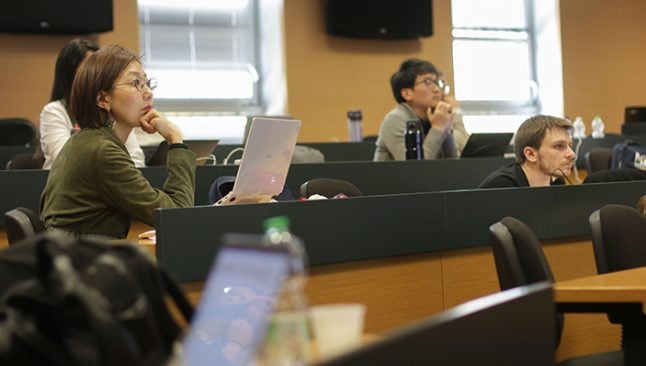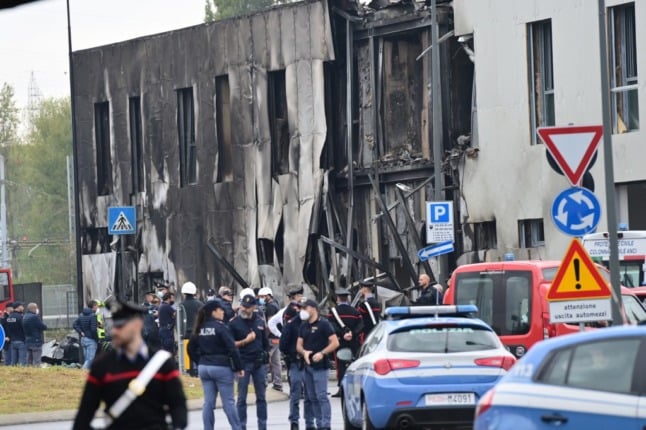Things are changing today though as companies reconfigure their organisation to deal with new challenges.
Digital transformation is the catalyst for change, not only in Italy but everywhere. It’s no longer a siloed function of a company, but rather the foundation of any business’ mid-to-long-term strategy. Business has changed and that rate of change will accelerate. Small, medium and large companies have to rethink their business model.
That’s why digital transformation is a major focus of the MBA and Executive MBA at MIP Politecnico di Milano School of Management. Milan’s leading Business School equips today’s professionals with the core skills in digital transformation they will need for tomorrow.
Find out more about the MBA programs at MIP

Photo: Riccardo Mangiaracina
“Digital transformation is imperative to all aspects of a company from marketing to logistics and supply chain,” says Riccardo Mangiaracina. Director of the International Flex Executive MBA, the Executive MBA offered in distance learning, at MIP.
“It is no longer a secondary function of a company, it is everywhere and the future success of a company depends on it.
“We believe in this world of very fast-paced change that it is the managers who have to have the competencies to lead digital transformation but it’s not so easy to find this knowledge on the market today.”
If a professional has the ambition to rise to the top of a company and to realise their true potential in their career, these skills are a must.
“If you want to become a leader in a company, say, to sit on a board, you must be able to master a digital transformation project,” continues Professor Mangiaracina. “It is not just a tactic, but it is a strategic necessity for the company. In order to successfully drive a digital transformation project you must be able to handle all the complexities which in many cases are related to culture, because I think the very first thing a leader in DT must develop is the right culture, the right attitude in changing the approach of the company.”

MIP has developed a part-time MBA that allows professionals to continue with their career while acquiring the crucial skills in digital transformation in a way that moves far beyond theory but has practical application in their current roles. As the leading business school in Italy, they can leverage their unique relationship with some of the world’s most successful companies in Milan as well as more traditional Italian businesses that have successfully managed their own programme of digital transformation.
Find out more about the MBA programs at MIP
“We are putting digital transformation at the heart of our programmes and we do it, not just with our own lecturers and staff, but in cooperation with managers coming from companies who leverage their success in digital transformation in the right way, with the right approach, with the right results. Not just the Big Tech companies like Amazon, who we collaborate with, but traditional companies who have been on their own journey of digital transformation and can share their learnings with our students on all the main waves such as Artificial intelligence, Internet of Things, Blockchain, Cloud, ecommerce and so on”.
Going back to study part-time while simultaneously holding down a demanding job may seem like an insurmountable challenge from the outside, but the reality is different says Flavio Raimundo, a Design Structural Engineer from Caldas da Rainha in Portugal, who is working with CEIIA in Milan. Raimundo saw a part-time MBA at MIP as the best way to realise his ambitions within his career.
 Photo: Flavio Raimundo
Photo: Flavio Raimundo
“I have some ideas for new products and developments and I believe the MBA will give me the skills and the basis to actually realise them,” he says.
Find out more about the MBA programs at MIP
“For me, MIP was a natural choice because I’m in engineering and that’s the basis of the university, which in any case welcomes students from very different backgrounds. The methodology and way of thinking is in line with the area I wanted to focus on. When I looked around, many of the others only focused on economics and financial. I found this was more for entrepreneurship rather than just equipping you to work in another company, so it was perfect for me.
“So for product design and developing, I’m already used to it, because that’s my field. With this MBA, I realised that when you have an idea, you can try to create it, but unless you communicate that idea properly, it will only ever stay as an idea. So for me, the key part of this MBA is acquiring the tools for the product that I’m developing.”
 Photo: MIP
Photo: MIP
As for going back to study while continuing to deliver your best output for your employer?
“It has been quite challenging, one of the main things is time management. I work as a consultant and we’re used to working a lot of hours,” he says. “Before I started the MBA I didn’t think it was possible to do anything more. I thought ‘I arrive home late and I’m exhausted’. I realised that my time management had to make it possible. If you want it you can do it. It’s doable. The more you do the more you can achieve. It’s about working smarter, that’s all.”
Of course, any university experience is not just about the theoretical knowledge and practical experience you gain while there but it’s just as much about the people you meet and the friends you make.
“The class in MIP we are over 50 people,” says Raimundo. “You can see that we are all hungry, so right away the mentality is different, the networking is different. I’m working with co-workers on new ideas and developments and I’m getting my classmates involved in certain areas. Experience and networking are definitely key for me!”
This article was produced by The Local Creative Studio and sponsored by MIP.
p.p1 {margin: 0.0px 0.0px 0.0px 0.0px; font: 14.7px Helvetica; color: #1f497d; -webkit-text-stroke: #1f497d}
span.s1 {font-kerning: none}



 Please whitelist us to continue reading.
Please whitelist us to continue reading.